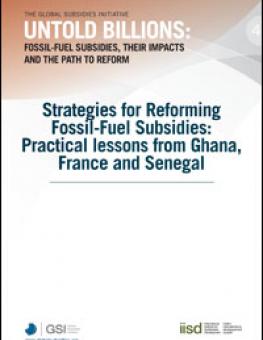
Strategies for Reforming Fossil-Fuel Subsidies: Practical lessons from Ghana, France and Senegal
This paper analyzes the experiences of countries that have undertaken reform of their fossil-fuel subsidies and establishes what lessons can be learned. It focuses in particular on France, Ghana and Senegal, as well as drawing from case studies of other countries and previous work that examines the reform of energy subsidies and price subsidies. The paper finds there is no single formula for success, but six important strategies are identified:
2. Establishment of reform objectives and parameters: clearly articulate objectives to help focus the reform strategy.
3. Construction of a coherent reform policy: ideally designed with support from a broad range of stakeholders.
4. Implementation: reform is not easy and may require several attempts.
5. Monitoring, evaluation and adjustment: policies can be adapted in light of new information, requiring a continual assessment of the underlying policy objectives.
6. Forward movement: successful reform requires the prevention of backsliding.
Papers in this series:
- Untold Billions: Fossil-fuel subsidies, their impacts and the path to reform: A Summary of Key Findings
- Effects of Fossil-Fuel Subsidy Reform: A review of modelling and empirical studies
- The Politics of Fossil-Fuel Subsidies
- Strategies for Reforming Fossil-Fuel Subsidies: Practical lessons from Ghana, France and Senegal
- Gaining Traction: The importance of transparency in accelerating the reform of fossil-fuel subsidies
- Mapping the Characteristics of Producer Subsidies: A review of pilot country studies
For information about the GSI's other reports on fossil-fuel subsidies, click here.
You might also be interested in
Tree Planting for Climate Resilience in Freetown, Sierra Leone
This assessment presents the economic valuation of tree planting efforts in Freetown, Sierra Leone, including planting costs, added benefits, and avoided costs.
Sustainable Asset Valuation of Sherwan Hill Adventure Park in Abbottabad, Pakistan
This report analyzes the social, economic, and environmental benefits of the Sherwan Hill Adventure Park in Pakistan.
December 2024 | Carbon Minefields Oil and Gas Exploration Monitor
In November 2024, 23 oil and gas exploration licences were awarded across five countries, with Russia granting the licences that account for the largest portion of embodied emissions.
Toward a Coherent, Transformative Approach to Financing Sustainable Development, Climate, and Nature
Four key proposals for the Fourth Financing for Development Conference (FfD4) to create an integrated, equitable approach to financing climate, nature, and development goals.